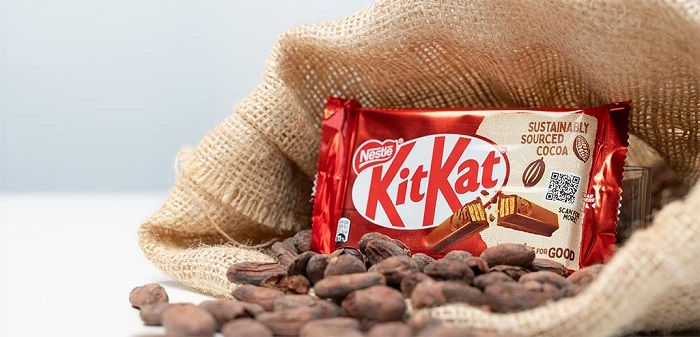Food & Beverage
Nestlé’s Income Accelerator Unleashes Cocoa KitKat in Europe

- Nestlé introduces the first KitKat made with cocoa from its income accelerator program, aiming to connect consumers with cocoa-farming families and promote cocoa sustainability.
- The income accelerator program supports over 10,000 families in Côte d’Ivoire, expanding to Ghana to reach 30,000 families, with a goal of impacting 160,000 families globally by 2030.
- Through collaborations with partners like Cargill and the Rainforest Alliance, Nestlé ensures traceability and sustainability in its cocoa sourcing, aiming for full segregation of cocoa sources and implementing a ‘mixed identity preserved’ model.
Nestlé has introduced the first KitKat made with cocoa mass from beans grown by farmer families engaged in the company’s income accelerator. This KitKat aims to connect consumers with the farmers in Nestlé’s program and raise awareness about the sustainability of the cocoa used in the iconic bars.
The innovative program was launched in January 2022 to help close the living income gap of cocoa-farming families and reduce child labor risk. At the same time, it strives to advance better agriculture practices and promote gender equality, empowering women as agents for positive change. The program incentivizes cocoa-farming families that enroll their children in school, implement good agricultural practices, engage in agroforestry activities, and diversify their incomes.
Nestlé’s income accelerator program has so far supported more than 10 000 families in Côte d’Ivoire and is expanding to Ghana this year to include a total of 30 000 families. By 2030, the program aims to reach an estimated 160 000 cocoa-farming families in Nestlé’s global cocoa supply chain to create impact at scale.
Nestlé has collaborated with various partners and suppliers to transform its global cocoa sourcing and achieve full traceability and physical segregation of the cocoa sourced from its income accelerator program. This means being able to track the entire journey of cocoa beans from origin to factory, while keeping them physically separated from other cocoa sources.
The cocoa mass from the income accelerator program adheres to one of the highest traceability standards, ensuring ‘mixed identity preserved’ traceability, enabling cocoa to be traced and stored separately. In addition, by mid-2024, Nestlé plans to use segregated cocoa butter for all of its KitKat chocolate in Europe, with plans to expand to other regions in the coming years.
“KitKat has consistently embraced innovation, centered around its iconic ‘Have a break, Have a KitKat’. Today, this innovation is brought to life through the Breaks for Good initiative that puts cocoa farmers at the center of our product through our income accelerator program,” commented Corinne Gabler, Head of Confectionery and Ice Cream at Nestlé. “We couldn’t think of a better brand than KitKat to represent our efforts to create meaningful impact in cocoa communities.”
The KitKat Breaks for Good will be available on store shelves starting from January 2024 in 27 European countries, and from May 2024, in the UK. In addition, a limited-edition KitKat, with 70% dark chocolate that is also made with cocoa sourced from the income accelerator, has been launched in the UK market as a pilot.
“Cargill is committed to supporting Nestlé’s longer term goals and their progress on delivering the Income Accelerator Program,” commented Michiel van der Bom, Product Line Director Cocoa & Chocolate Europe West Africa, Cargill. “As a partner on Nestlé’s sustainability journey, we are implementing solutions to source sustainable ingredients for Nestlé in ways that help restore the environment, support families, and increase incomes. Through our partnership, we are building a stronger, more resilient supply chain together.”
“We’re delighted to collaborate with Nestlé on their journey towards more sustainable cocoa sourcing,” said Thierry Touchais, Manager, Strategic Accounts at the Rainforest Alliance. “It’s encouraging to find a company of this scale using a ‘mixed identity preserved’ model in which cocoa can be traced back to Rainforest Alliance certified farmers engaged in Nestlé’s income accelerator. The approach showcases the potential for positive change in the industry.”
Source: Nestlé























































